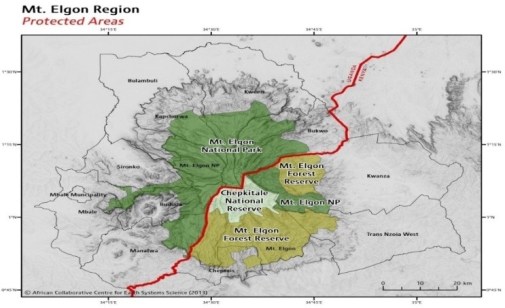Mountain EbA-Kenya
Mountain EbA – Kenya Project

Chepkitale National Reserve, ©IUCN ESARO
However, the health of this mountain ecosystem is threatened on several fronts. Challenges include encroachment and land fragmentation, both driven by local communities with high population densities and a strong dependence on rain-fed agriculture. Overharvesting of wood products from the forest is another challenge along with the many uncertainties of a rapidly changing climate. Consequently, this ecosystem is less able to provide the many services required for resilient livelihoods and economic development, and it is increasingly vulnerable to the negative impacts of climate change such as floods and landslides.
The Mountain EbA project in Kenya is being implemented on Chepkitale National Reserve, gazetted in 2000 as a trust land owned by the Bungoma County Government but managed by the Kenya Wildlife Service. Before its gazettement, the local Ogiek indigenous community owned this place as their ancient homeland. Since 2000, they have been forcefully evicted from their homeland which has resulted in debates about ownership, tenure and access rights. The Ogiek subsequently took the matter to court for arbitration. The matter is still in court and they have a strong case supported by a provision on land tenure in Kenya’s 2010 constitution that allows local communities to directly own trust lands.

The Mountain EbA Kenya project in the Chepkitale site is seeking additional financial resources to support key ecosystem-based adaptation measures in the Reserve: 1) protect and stabilize springs located closer to the villages to improve access to clean water and to ensure its efficient use; 2) establish gravity-fed water systems from perennial rivers to ensure access to clean water in the villages; 3) re-forest using indigenous tree species—filling forest gaps where trees have fallen to sustain and increase the tree cover; 4) remove unpalatable manyatta grass as part of the process to enrich pastures with grass species that are better for grazing; and 5) enhance local products such as milk and honey by including associated value chain and eco-tourism opportunities.
Our project also supports the Kenya Wildlife Service in developing the Kenya Wildlife Adaptation Strategy.
Mountain EbA Project Collaborators in Kenya
–Ogiek Community in Chepkitale National Reserve
–Chepkitale Indigenous People Development Project
–Kenya Wildlife Service
Download Fact Sheet: “Scaling Up Mountain EbA – Kenya”
Link to the Scaling Up Mountain EbA projects in NEPAL, PERU, COLOMBIA, BHUTAN and UGANDA.
To learn more about Mountain EbA projects in Kenya, please contact: International Union for the Conservation of Nature (IUCN), Eastern and Southern Africa Regional Office, Nairobi, Kenya
Email: info.esaro@iucn.orgThe official name of our program is “Scaling Up Mountain Ecosystem-Based Adaptation: building evidence, replicating success, and informing policy”. This program is part of the International Climate Initiative (IKI). The Federal Ministry for the Environment, Nature Conservation and Nuclear Safety (BMU) supports this initiative on the basis of a decision adopted by the German Bundestag. Our Mountain EbA Program is led by The Mountain Institute (TMI) and implemented jointly with the International Union for the Conservation of Nature (IUCN) and country partners over the period 2017-2020.
